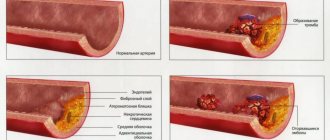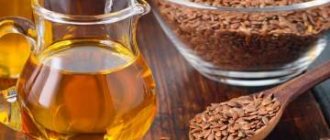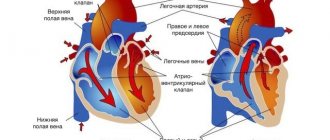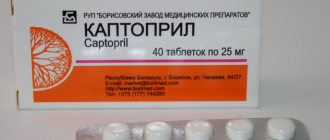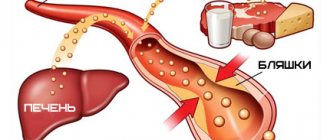Atherosclerosis, which is based on a complex of complex disorders of lipid metabolism, is one of the most important risk factors for the development of vascular accidents. Closely associated with it, hypercholesterolemia is detected in more than 60% of hospitalized patients aged 30–69 years [1]. Therefore, drugs that help normalize lipid parameters are in steady demand in pharmacies. In all likelihood, it will only grow: after all, the average age of the Russian population is growing and the number of patients with cardiovascular diseases is increasing. And in order to conduct high-quality pharmaceutical consultations, it is important for primary care providers to remember how lipid-lowering drugs work, what side effects they exhibit, and what the client must be warned about with the appropriate prescription.
The best pills to lower blood cholesterol.
May 13, 2021
8113
5
2
Content
- Atoris
- Livazo
- Ezetrol
- Roxera
- Ineji
If you have had a blood test that shows that your cholesterol levels are elevated, be sure to consult your doctor. He will give recommendations on nutrition and lifestyle adjustments. If necessary, he will prescribe the most effective cholesterol pills that will reduce the risk of developing dangerous diseases.
Read also Top 10 best blood thinners Blood thinners Lipidogram
is a blood test for cholesterol, and if it shows a high level of only “bad” or total cholesterol, you should take this seriously and do everything to reduce these levels.
For some people, to reduce cholesterol, it is enough to change their lifestyle (diet and more physical activity), but for others whose levels are too high, they need to add drug treatment. If your doctor has prescribed you medications to lower cholesterol levels, take them according to a clearly indicated schedule and do not skip them, because your health depends on it.
There are different groups of drugs to normalize cholesterol .
Statins.
They are suitable for most patients, and they are the only drugs that directly reduce the risk of heart attack or stroke. If statins do not help you or there are unwanted side effects, your doctor will help you choose cholesterol pills from a different group.
PCSK9 inhibitors.
Drugs in this group for lowering “bad” cholesterol deactivate the protein in the liver. PCSK9 inhibitors are often prescribed in parallel with statins.
Selective cholesterol absorption inhibitors.
This is a relatively new group of drugs that interfere with the absorption of cholesterol in the intestines. SIACs are most effective in reducing the level of “bad” cholesterol, and can also increase “good” cholesterol. Such medications are prescribed for high cholesterol levels, as well as for some hereditary problems with lipid metabolism.
Resins.
This group of cholesterol-lowering drugs is also called bile acid sequestrants or bile acid binders. Resins act in the intestines, helping to remove cholesterol. Our body uses cholesterol to produce bile. If the level of bile in the gastrointestinal tract is insufficient, the liver will stimulate its production, and the more bile produced, the more cholesterol the liver needs. As a result, less of it will circulate in the blood.
Fibrates.
These drugs are very good at lowering triglyceride levels and often normalize the “good” level. At the same time, fibrates have virtually no effect on “bad” cholesterol.
Niacin (nicotinic acid, vitamin PP or B3).
This substance affects the production of fats by working in the liver. When taking drugs from this group, it is necessary to monitor liver function, since niacin is toxic. Side effects include: upset stomach, redness, itching. Patients with diabetes should take the drug with caution, as it may increase blood sugar levels.
Omega-3 ethyl esters.
Cholesterol drugs in this group are made from fish oil (modified and purified). Prescribed against the background of a special diet to reduce cholesterol levels. Serious side effects may occur in patients with allergies to fish or shellfish.
Fish oil with omega-3 polyunsaturated fatty acids (PUFAs).
These supplements are also called omega-3 acids and are prescribed to lower triglyceride levels.
All of the above drugs should be prescribed exclusively by a doctor, because there are contraindications and side effects with large doses of such drugs. Dangerous side effects include hemorrhagic stroke and sugar spikes in diabetics.
In Russia, doctors usually prescribe statins to lower cholesterol levels, so let’s talk about drugs from this group.
Atoris
This cholesterol-lowering drug comes in tablet form and is available by prescription. The active substance is atorvastatin. "Atoris" is a third-generation cholesterol-lowering medicine and, when taken in a course, helps to cope with the problem. Typically, this drug is prescribed for severe forms of hypercholesterolemia, hereditary high cholesterol, etc. Atoris is indicated for diseases of the cardiovascular system, high risks of coronary artery disease and heart attack.
Cholesterol pills are generally well tolerated, although they do have side effects: joint pain, digestive problems, constipation, muscle pain, liver problems and increased blood sugar.
Contraindications include pregnancy, breastfeeding, serious liver and kidney diseases. In parallel with taking Atoris, you should not drink grapefruit juice or eat the fruit itself.
Atoris
JSC "Biolek", Ukraine
hypercholesterolemia: - as an adjunct to diet to reduce elevated total cholesterol, LDL-C, apo-B and TG in plasma in adult patients, adolescents and children aged 10 years or older with primary hypercholesterolemia, including familial hypercholesterolemia (heterozygous) or combined (mixed) hyperlipidemia (type IIa and IIb, respectively, according to the Fredrickson classification), when the response to diet and other non-drug treatment methods is insufficient;
- to reduce elevated total cholesterol, plasma LDL cholesterol in adult patients with homozygous familial hypercholesterolemia as an adjunct to other lipid-lowering treatments (for example, LDL apheresis), or if such treatments are not available. prevention of cardiovascular diseases: - prevention of cardiovascular events in adult patients at high risk of developing primary cardiovascular events, as an addition to the correction of other risk factors; — secondary prevention of cardiovascular complications in patients from 161
843
- Like
- Write a review
Something interesting
Novartis got its hands on inclisiran after it bought The Medicines Company in November 2019 for $9.7 billion in cash. The latter acquired worldwide rights to inclisiran from its developer, Alnylam Pharmaceuticals, in February 2013: for an upfront $25 million and a potential $180 million as it progresses through certain development stages, plus a double-digit royalty from sales of the finished drug.
The hefty sum that Novartis paid should be offset by sales of Lequio, either through high demand for the drug or a high price for it. However, there is no need to rush into “charging” the hellish price tag: the patent protection of inclisiran expires only in 2035.
Lequio, it is believed, needs to reach a peak of $2.2 billion in annual sales to at least recoup the money Novartis spent on the takeover of The Medicines Company.
By the way, Novartis was not particularly far-sighted. Yes, the pharmaceutical company from Basel entered into a five-year agreement with Alnaylam back in 2005, paying $10 million in advance and acquiring its 19.9 percent stake. But in 2010, the Swiss pharmaceutical giant refused to exercise the right to purchase non-exclusive rights to integrate the RNAi platform and Alnaylam intellectual property into its developing projects for $100 million. In 2015, Novartis sold all RNAi-related assets to Arrowhead Pharmaceuticals, including licensing the Alnilam platform against three dozen therapeutic targets.
Livazo
These fourth generation high cholesterol pills are available by prescription. The active substance of Livazo is pitavastatin. This cholesterol medicine is best suited for people with diabetes: it does not increase blood sugar levels or affect glucose metabolism. It is very important to choose the right dose of the drug to prevent unwanted serious reduction in cholesterol.
Livazo
Pierre Fabre, Switzerland
- primary hypercholesterolemia, including heterozygous familial hypercholesterolemia (hyperlipidemia type IIa according to Fredrickson classification) or mixed hypercholesterolemia (hyperlipidemia type IIb according to Fredrickson classification), hypertriglyceridemia (hyperlipidemia type IV according to Fredrickson classification) as an addition to diet, when diet and other non-drug treatments (eg exercise, weight loss) are insufficient.
from 635
786
- Like
- Write a review
Ezetrol
The tablets can be purchased with a prescription, and the active ingredient in the cholesterol drug is ezetimibe. "Ezetrol" selectively prevents the absorption of cholesterol. This is a new generation medicine that does not stimulate the secretion of bile acids and does not inhibit cholesterol synthesis in the liver. The main effect of Ezetrol is aimed at reducing the flow of bile acids from the intestines to the liver. Thus, cholesterol reserves are reduced and it is intensively removed from the blood. "Ezetrol" is indicated for diabetes mellitus and various causes of high cholesterol.
Side effects include changes in blood tests, allergies and diarrhea. This drug is contraindicated during pregnancy, breastfeeding, and serious liver diseases.
Ezetrol
Schering-Plough, Switzerland
Primary hypercholesterolemia (in combination with statins or as monotherapy in addition to diet to reduce elevated levels of total cholesterol, LDL cholesterol, apolipoprotein B and triglycerides, as well as to increase HDL cholesterol levels in patients with primary hypercholesterolemia);
homozygous familial hypercholesterolemia (in combination with statins it is recommended to reduce elevated levels of total cholesterol, LDL cholesterol, and the use of LDL apheresis is also possible); homozygous sitosterolemia (or phytosterolemia) - increased levels of plant sterols in plasma with elevated or normal levels of cholesterol and normal triglycerides. from 1024
583
- Like
- Write a review
Statins
Statins are a class of drugs that suppress the production of cholesterol in the liver [2]. If the enzyme that synthesizes cholesterol works normally, then the substance is formed in a natural manner and in the right quantity. Statins interfere with enzyme function. Because of this, one of the key reactions necessary for the formation of cholesterol is interrupted. Less and less cholesterol is produced, and the level of lipids in the blood gradually decreases [2] [3].
When using statins, the ability of cells to take up low-density lipoprotein cholesterol (LDL-C) from the bloodstream increases [2]. On the surface of liver cells there are receptors - molecules that react in a special way to the level of LDL cholesterol and help reduce it. Under the influence of statins, the number of these receptors increases and the level of LDL-C decreases. This is another effect of statins that works to lower cholesterol.
Each of the statins is capable of lowering cholesterol in the blood. The differences relate to how strong the effect will be. The selection of the drug is made by a therapist or cardiologist. Statins are generally well tolerated and the likelihood of serious adverse events is low.[2],[3]
Roxera
Cholesterol-lowering tablets are available by prescription and the active ingredient is rosuvastatin. This is the most modern drug of the fourth generation, which has a minimum of side effects. “Roxera” reduces “bad” cholesterol and normalizes “good” cholesterol, cleanses blood vessels of fat deposits and reduces the risk of the formation of cholesterol “plaques”.
This drug is prescribed for the prevention of atherosclerosis with negative heredity in this regard; for the treatment of atherosclerosis, which already exists, as well as its complications. The huge advantage of the drug is that it helps not only fight atherosclerosis, but also relieves inflammation in blood vessels.
"Roxera" should be taken with caution if you have liver disease; taking this medicine during pregnancy and lactation is prohibited. You should not take alcohol or any antibiotics if you are taking Roxera.
Roxera
KRKA (KRKA), Slovenia
- primary hypercholesterolemia (Fredrickson type IIa) or mixed dyslipidemia (Fredrickson type IIb) as an addition to diet when diet and other non-drug treatments (for example, exercise, weight loss) are ineffective;
- familial homozygous hypercholesterolemia as an addition to diet and other lipid-lowering therapy (for example, LDL apheresis) or if such therapy is not effective; - hypertriglyceridemia (type IV according to Fredrickson) as an addition to the diet; - to slow the progression of atherosclerosis as an addition to the diet in patients who are indicated for therapy to reduce plasma concentrations of cholesterol and LDL cholesterol; - primary prevention of major cardiovascular complications (stroke, myocardial infarction, arterial revascularization) in adult patients without clinical signs of coronary artery disease, but with an increased risk of its development (age over 50 years for men and over 60 years for women, increased plasma concentration of C- reactive protein (≥2 g/l) if present, minimum 275
1292
- Like
- Write a review
Fibrates
One of the ways to reduce the amount of lipids in the body is to increase their breakdown. This can be achieved by playing sports - physical activity leads to a decrease in body fat reserves [2]. Another way is to enhance the process of lipid breakdown with drugs.
Fibrates are drugs that can stimulate the breakdown of lipid molecules inside cells [2] [3]. The amount of lipids in cells decreases, and they are forced to take fats from the blood for their own needs. The amount of LDL-C decreases the most.
Ineji
These high cholesterol pills are also available with a prescription only. Ineji belongs to a new group of drugs - statins with cholesterol absorption inhibitors. The active ingredients of Ineji are simvastatin and ezetimibe. The medicine does an excellent job of reducing “bad” cholesterol.
Ineji is prescribed for the prevention of cardiovascular diseases, for coronary heart disease, after a stroke or heart attack (to prevent recurrent ones), for severely elevated lipids and hereditary problems with cholesterol.
Contraindications: allergic reactions, liver diseases, pregnancy, breastfeeding, age under 18 years, lactase deficiency. Side effects: depression, dizziness, joint pain, nausea, memory problems.
